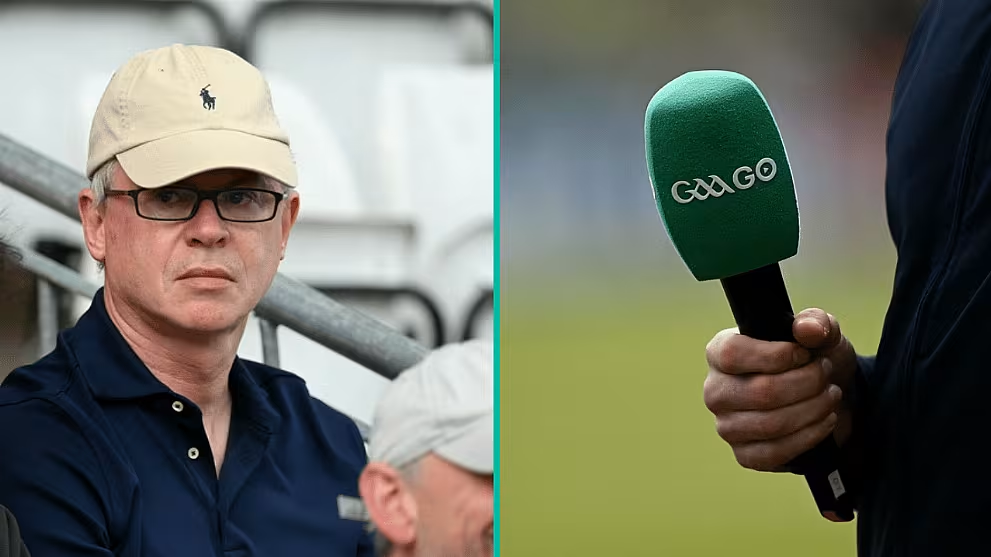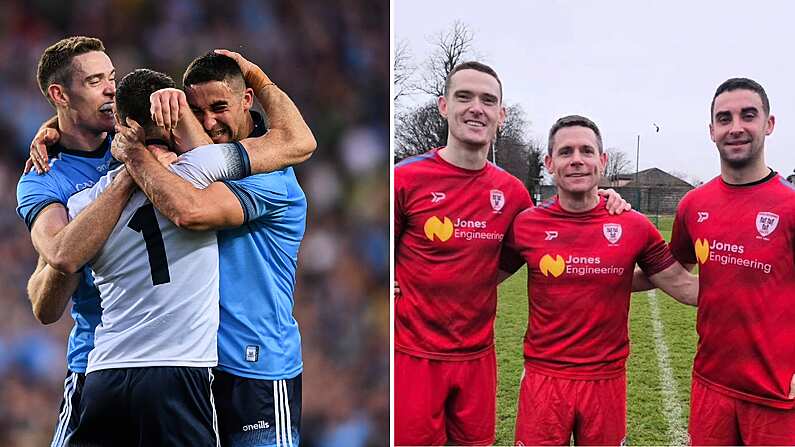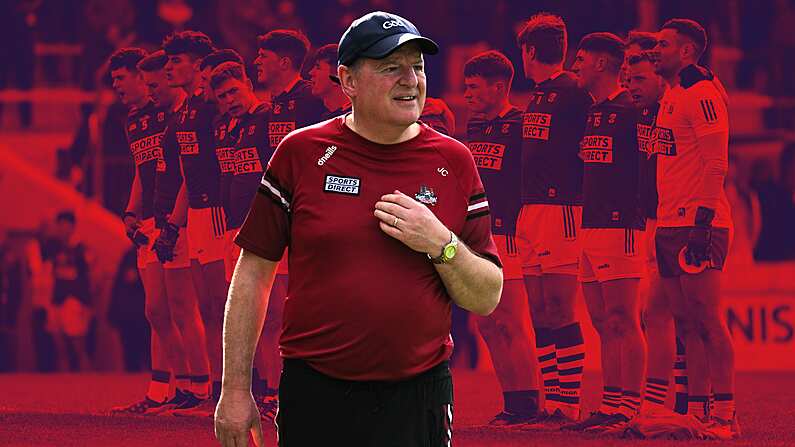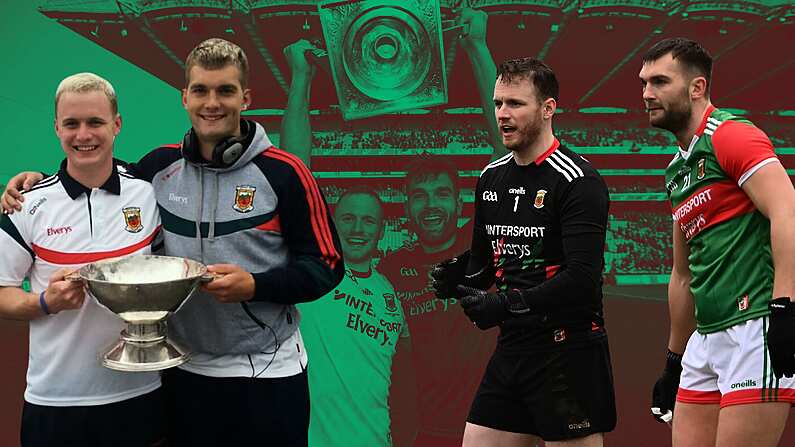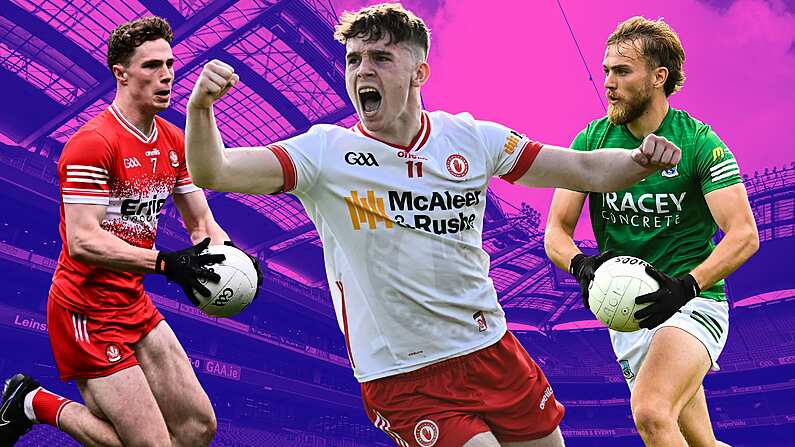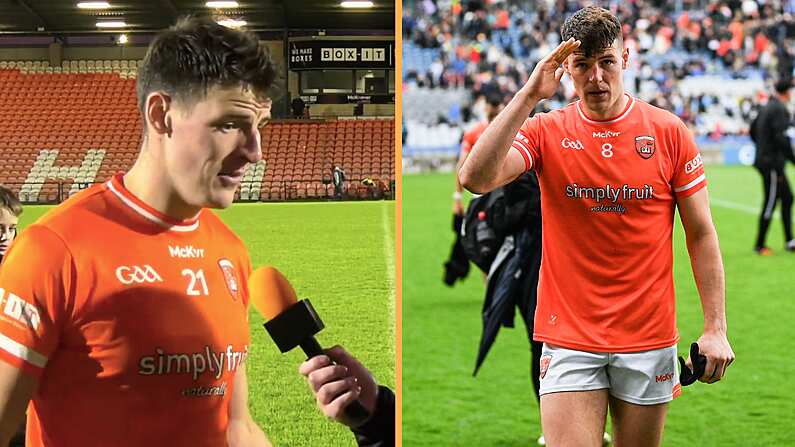Ahead of Sunday's All-Ireland senior football quarter-final, which sees the Mayo and Dublin rivalry reignited, we've taken a look at one of the most fascinating rivalries in the history of Gaelic football.
It is strange to look back and consider now, but there was a time when the rivalry between Dublin and Mayo was not all that ferocious. Prior to the turn of the century, the sides did not meet very often in the championship.
That was all to change over the last decade and a half, but the seeds for what was to come were first sewn in 2006.
Dublin v Mayo: How the great modern rivalry was born
2006
When the two sides met in the 2006 All-Ireland semi-final, Mayo would have been seen as the more established team. After all, they had been in the All-Ireland only two years previous, a stage Dublin had not sniffed since 1995.
Of course, this game would affectionately become known as 'The Mill at the Hill'.
After Mayo ran down to warm up in front of Hill 16, the spot traditionally occupied by Dublin, everyone could sense what was coming next.
The Dubs also went down to that end of Croke Park, with neither side conceding any quarter.
Mayo would win that game, but his was only a taster of what was to come in the years that followed.
READ HERE: GAA Team News: Matchday Panels For The Sam Maguire Quarter-Finals
2012
We would have to wait until 2012 until the side met in championship once again. It would not be an exaggeration to say that what developed over the next few seasons was the greatest rivalry in the modern era of Gaelic games.
Dublin entered the 2012 All-Ireland semi-final as hot favourites on the back of their first Sam Maguire in 16 seasons the previous year. Few predicted what was to come.
Mayo blew Dublin out of the water for much of the game, at one stage leading by ten points in the second half. Pat Gilroy's side would reduce that down to two at one stage, but that was as close as they got.
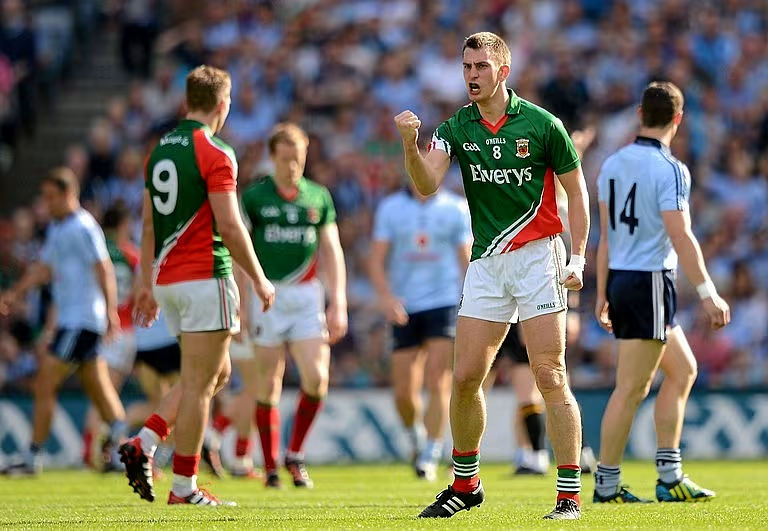
Mayo celebrate their victory over Dublin in the 2012 All-Ireland football semi-final (Photo: Sportsfile)
James Horan's men used some questionable tactics to see out the result, repeatedly fouling Dublin as they chased a goal in the closing stages. While it secured the victory, they came in for some heavy criticism in the aftermath.
The result saw Pat Gilroy saw step down, with the relatively untested Jim Galvin taking his place.
The bad blood was brewing.
READ HERE: 55 Standout Names Playing GAA In America This Summer
2013
It wasn't to be for Mayo in the final against Donegal, but they would exorcise those demons the following year by beating Jim McGuinness' side by 16 points on their run to a second consecutive decider.
You can probably guess who was waiting for them.
It was a nervy affair, but Bernard Brogan was ultimately the difference between the sides. He scored 2-3 to help his side to a one-point win.
The cynicism on show was also reversed on this occasion.
Dublin repeatedly fouled the opposition late in the game to stop them getting up the pitch. In all, they committed 32 fouls in comparison to Mayo's 12, although Jim Gavin believed the referee had been very harsh on his team.
James Horan saw it differently. Speaking after the game, he questioned Gavin's view and slammed Dublin's cynical play
I find that amazing. I find it absolutely amazing if that was the comment.
I know Jim made another interesting comment, that he’d walk away if his team were cynical so maybe that’s another comment Jim should look at.
What was the free count? And what were Dublin saying after the semi-final (between the two counties) last year, were they shouting up and down about it?
Sure look it, fair play to Jim and fair play to Dublin, they won the game and they deserved to win it.
More fuel to the fire.
READ HERE: Burke And Dolan Think New GAA Championship Just Needs Small Tweak
2015
2014 was one of only two years in the last decade in which they didn't meet, but things were back with a bang in 2015.
The first semi-final between the pair has gone down in infamy over the years, with a number of unsavoury incidents in the drawn game. It was clear that tension that had been building had an impact.
An altercation between Cillian O'Connor and Rory O'Carroll only three minutes into the game would see the Dublin defender left bloodied on the ground. He would require ten stitches for the injury and would not return to the field of play.

A bloodied Rory O'Carroll during Dublin's clash with Mayo in 2015 (Photo: Sportsfile)
That was far from the only incident.
Phill McMahon would be accused of headbutting Aidan O'Shea, while Lee Keegan and Diarmuid Connolly would take lumps out of each other all game. That resulted in a wrestling match at one point, with Connolly getting the line while his marker received a yellow card.
In the aftermath of the game, referee Joe McQuillan came in for huge criticism for failing to control the players.
However, Kevin McStay said there was not a whole lot the official could do considering the behaviour of both teams. He also slammed McMahon for faking an injury at one point after the supposed headbutt.
It was at times unrefereeable. I can’t criticise Joe McQuillan too much...
You had a Dublin player today diving and feigning injury. He held up the game for nearly two minutes holding his head and he was not struck. In fact he was attempting to get Aidan O’Shea into trouble and that has no place in the game.
I don’t like saying that about Philly but there were times today where his self-discipline was lost. He was out of control.
By the time the replay rolled around two weeks later, the country had caught a severe dose of Dublin-Mayo fever for which no vaccine was available. The game was the talk of the country, with the Electric Picnic organisers even agreeing to construct two giant screens so festival goers wouldn't miss a second of the action.
The buildup to the game was dominated by the appeal process for Connolly's red card. The Dublin camp were of the opinion the punishment was too harsh and wanted him available for the replay.
The decision was upheld by Central Hearings Committee on the Tuesday of the week of the game. However, there would be a final twist in the tale. The Central Appeals Committee would waive his ban at 2am on the morning of the match, allowing him to take part.
The second game was a much calmer affair, although there was some scintillating football played at times. Mayo held a four point lead early in the second half, but a classic Dublin run changed the course of the game. They scored 2-4 without reply in the space of ten minutes, which proved to be the difference.
READ HERE: Lee Keegan Has One Big Concern For Mayo Ahead Of Dublin Clash
2016
In a development that shocked nobody, the two teams would meet once again in the 2016 final.
Things boiled over before the ball was even thrown in, with the two sides involved in a bit of a fracas in the tunnel as they made their way onto the pitch.
This was without doubt the strangest game between the pair. If you had told James Horan that not a single Dublin player would score in the game until the 31st minute, he probably would have thought his side were in a fantastic position to go and win the game.
The only issue was that his side conspired to score two own goals in that opening half an hour. It was an unprecedented piece of misfortune, with owns goals incredibly rare in Gaelic football. To score two in one game is remarkable.
Once again, the match was dominated by the battle between Keegan and Connolly.
There were a number of off the ball incidents involving the pair, although both would remain on the pitch for the full game.

Lee Keegan and Diarmuid Connolly clash at Croke Park (Photo: Sportsfile)
Dublin held the lead in the closing stages of the game, but a late Mayo rally got them back within touching distance. Ultimately, Cillian O'Connor would kick the levelling score late in the game to send us to yet another replay.
In the lead up to that day, various Dublin GAA voices in the media would voice their objections to Lee Keegan's hands on approach to marking Connolly.
Speaking on The Sunday Game, Ciaran Whelan hinted that the officials needed to come down harshly on the Westport man as he felt he was the one causing the majority of the off the ball trouble:
One of the things I have an issue with through the years is the instigator, whoever starts it. Generally, are forwards going to instigate incidents like that?
No, the forward is trying to play football and the defender is trying to stop him and he's doing it probably in an over-aggressive manner.
That's where the other officials have to come in and they have to nip this in the bud early on.
This resulted in RTÉ receiving a number of complaints from the public about the panel's perceived bias towards Dublin.
Some felt this may have played a part in Keegan getting a black card in the first half of the game, a punishment that was also handed out to Johnny Cooper.
The key incident of the game came when Rob Hennelly, who had come in as Mayo goalkeeper to replace David Clark after his questionable performance the first day, received a black and card and gave away a penalty which Connolly tucked away.
This gave The Dubs a three-point lead, although Mayo did manage to get within a point in injury time. However, Cillian O'Connor would miss a last gasp free to hand the trophy to Jim Gavin's side.

Philly McMahon hoists Sam Maguire aloft in front of Hill 16 (Photo: Sportsfile)
2017
This was the peak of the rivalry.
Dublin and Mayo were set for a seventh championship meeting in six years, a record for two teams from different provinces. It was also the first time since 1988 that an All-Ireland final featured the same teams as the year before.
While the game itself did not feature quite as much controversy as in previous editions, there was plenty of drama nonetheless.
At a pivotal stage in the game, John Small would receive a second yellow card for a hefty challenge on Colm Boyle. It had the potential to alter the course of the game, if not for Donal Vaughan's reckless actions.
He retaliated with a shoulder to the face of Small, receiving a red card of his own as a result.
It's hard not to think that the result would have been different if Vaughan had kept the head.
The two sides were level deep into injury time when Dean Rock was handed the chance to win the game from a free. He would score it, but not before Lee Keegan tried to put him off his game with the use of a GPS.

Lee Keegan throws a GPS at Dean Rock as he takes the decisive free of the 2017 All-Ireland final (Photo: Sportsfile)
Before the resulting kick-out could be taken, Dublin attempted to kill the game by dragging a number of Mayo players to the ground and forcing the referee to intervene.
It did the job as they emerged as one-point winners.
At this point, there was a sense that Dublin had the number of an ageing Mayo team.
2019
The semi-final in 2019 was a tame affair compared to years gone by.
Many wrote Mayo off in the buildup to the game, but that seemed to spur them on to a fast start in Croke Park. They were ahead by 0-8 to 0-6, although you could guess what was coming next.
Famous for their strong third quarters, The Dubs scored 2-6 without reply after the interval to take a ten-point lead.
Game over and the end of that Mayo team as we knew it.
2020
It was thought that 2020 would be a year of transition for Mayo and that turned out to be the case somewhat. They blooded a number of new talents, with the likes of Matthew Ruane, Tommy Conroy, and Oisin Mullen establishing themselves as key figures in the team.
However, they still managed to make their way back to the All-Ireland final.
They were given very little chance against a Dublin side on the hunt for a sixth consecutive Sam Maguire, one that had hardly broken a sweat in the championship up until that point.
Revitalised under James Horan, Mayo provided a sterner test than expected.
For the first 55 minutes or so, they managed to match Dublin stride for stride. Five points on the trot directly after the water break changed all of that, with Dessie Farrell's side never looking back.

Dublin lift the Sam Maguire trophy after the 2020 All-Ireland football final (Photo: Sportsfile)
It was a routine win in the end, but was it the beginning of a new age in this rivalry?
2021
14th of August 2021. The date Mayo finally got the better of the Dubs, for the first time in nine meetings.
On a rain-soaked afternoon, it was a memorable semi-final, as a gritty battle played out on the Croke Park pitch.
When Dublin went in at the break six points ahead, it seemed as though it would simply be more of the same for Mayo, and that it would be another painful trip back home to the west.

14 August 2021; Diarmuid O'Connor of Mayo keeps the ball in play in the build up to a Mayo point during the GAA Football All-Ireland Senior Championship semi-final match between Dublin and Mayo at Croke Park in Dublin. Photo by Stephen McCarthy/Sportsfile
But, in sensational fashion, the Westerners fought back to level things up with a 45 taken deep into stoppage time by goalkeeper Rob Hennelly - after some heroics from Diarmuid O'Connor to prevent the ball going out of play for a Dublin kick-out.
Dublin looked spent, and their cynical display in extra time earned them two black cards for Tom Lahiff and James McCarthy. After years of coming up short, Mayo had finally beaten Dublin - though they would go on to lose to Tyrone in the final.
Two years later, both counties meet at crossroads. Mayo, with Kevin McStay in charge, have seen several stalwarts depart in recent years, and there is a new flavour to this team. Dublin, on the other hand, have recalled several of their old guard for 2023, in the form of Jack McCaffrey, Paul Mannion, and Stephen Cluxton. Will there be one last heyday for this great Dublin team, or have Mayo pushed past them once again?
Only time will tell. Bring on throw-in on Sunday.
The first version of this article was originally written in 2021.



